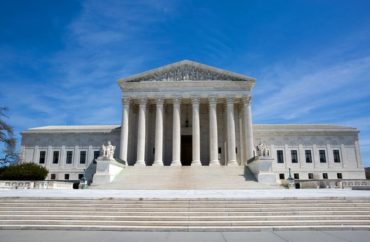
Prominent professors of law, politics and history have filed amicus briefs in Dobbs v. Jackson Women’s Health Organization.
The briefs urged the Supreme Court to allow Mississippi to institute a ban on abortions at fifteen weeks and to allow other states to prohibit abortion at that point and earlier. One brief argues that nationwide abortion should be illegal, because it violates the Constitution’s guarantee on the protection of life.
The case will be heard in the new term that starts in October.
Retired Villanova law Professor Joseph Dellapenna argued that the Supreme Court relied on faulty history in 1973 in ruling that abortion could be legal through all nine months of pregnancy under the general guise of women’s health.
Dellapenna, who is a historian of abortion law, criticized the 1973 Court for relying on “advocacy pieces with a highly selective examination of the evidence to support a partisan and distorted reading.” The abortion advocates relied on faulty history and ignored the nearly 800 years of an established record of laws that prohibited abortion, Dellapenna argued.
He explained:
Despite the relative unpopularity of abortion techniques to rid oneself of an unwanted child due to the serious risks of abortion treatments to the mother, common-law indictments and appeals of felony for abortion are recorded as early as 1200. While the terse records often do not indicate the outcome of the proceedings, the many records indicating punishment18 and judgments of “not guilty” rather than dismissal prove that the indictments and appeals were valid under the common law.
His brief delves deeper into the history of abortion laws to make the argument that common law history would support giving the government the power to prohibit abortion.
The term ‘viability’ is too vague, University of Georgia law professor says
University of Georgia Professor Randy Beck, a constitutional law chair at the public institution, said that Roe’s reliance on the “viability” of the preborn baby should no longer be the standard of abortion jurisprudence.
The Supreme Court has never offered a principled explanation for why the Constitution bars a state from protecting the life of a fetus before it can survive outside the womb with medical assistance. The Court’s failure to justify the viability rule arises from the rule’s arbitrary character. While viability is an important line for medical purposes, incremental changes in respiratory capacity and advances in medical technology that influence survival have no moral or legal significance that would warrant making viability the critical dividing line for purposes of amenability to protection by the state
Beck argued the 1973 Court never justified its viability standards. “Before the year [1973] was out, articles in both the Yale Law Journal and the Harvard Law Review had highlighted Roe’s failure to justify the viability rule,” Beck wrote.
His brief laid out other court rulings on abortion that failed to justify the viability standard.
The 14th Amendment views preborn babies as humans
Two political philosophers presented evidence in their amicus brief that the 14th Amendment should be understood to prohibit abortion.
Professors Robert George of Princeton University and John Finnis of Notre Dame University take the stance that the 14th Amendment protects preborn babies from the deprivation of life. The Roe Court said in its opinion that if babies were included under the Fourteenth Amendment then there would not be a constitutional right to abortion.
Finnis and George argue that nationwide abortion should be made illegal under the Constitution.
They explain that the amendment, “was meant to sustain, codified equality in the fundamental rights of persons—including life and personal security—as these were expounded in [William] Blackstone’s Commentaries and leading American treatises.”
“Authoritative treatises—including those deployed specifically to support the Civil Rights Act of 1866, which the Fourteenth Amendment aimed to codify— prominently acknowledged the unborn as persons,” George and Finnis said.
“Leading eighteenth-century English cases,” the pair explained, “later embraced in authoritative American precedents decades before ratification, declared the general principle that unborn humans are rights-bearing persons from conception.”
Their brief details the history of the Court applying the Fourteenth Amendment to corporations and argues that it must apply to preborn babies too.
Notre Dame law Professors Carter Snead and Mary Ann Glendon also wrote that abortion jurisprudence “entrenches in the law a vision of human identity and flourishing that is not only constitutionally unwarranted, but is also false and pernicious.”
“The ‘manifestly absurd [and] unjust’ precedents that comprise this jurisprudence should be overruled,” Glendon and Snead wrote, “and the American people should be permitted to join the supermajority of nations around the world where citizens themselves have been allowed to deal with this contested matter through ordinary democratic political processes.”
IMAGE: Steven Frame / Shutterstock
Like The College Fix on Facebook / Follow us on Twitter




Add to the Discussion